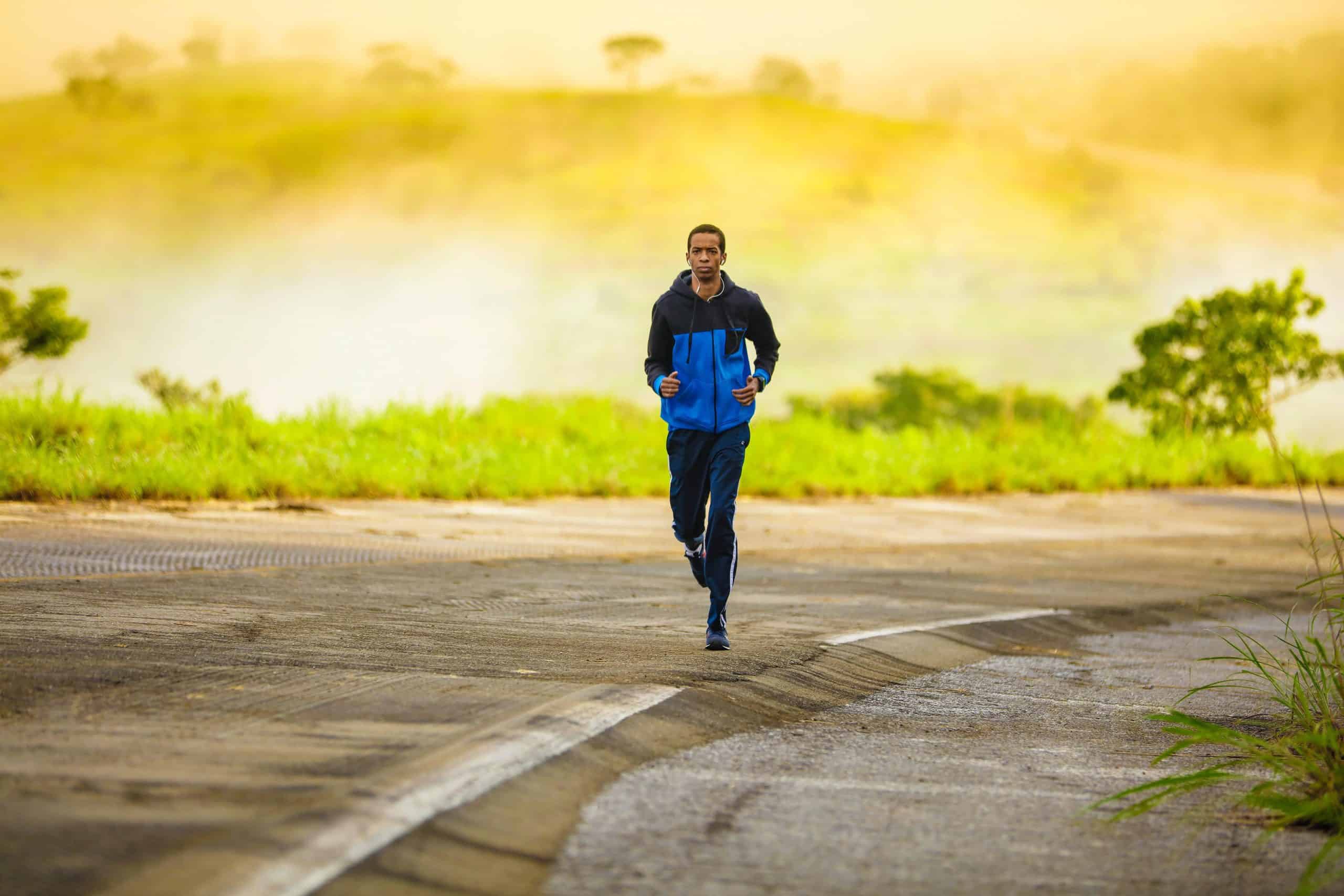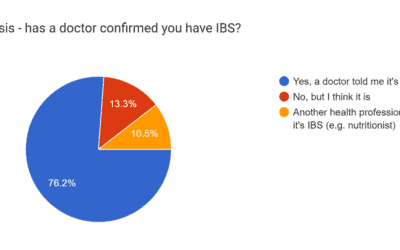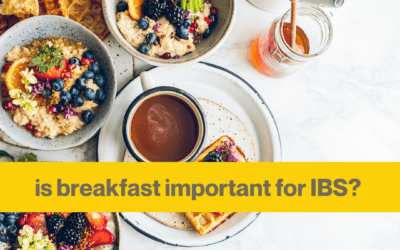If you have tried running with IBS you may find strenuous exercise can give you diarrhoea, cramps or stomach pains.
For those who run long distances you may get caught short with no toilet near you.
How does exercise affect IBS?
If you have Irritable Bowel Syndrome (IBS) you probably experience pain, cramps, changes in your bowel habits (e.g. constipation or diarrhoea), bloating and feeling like your digestion reacts to all kinds of foods.
You may find that exercise makes things worse.
Of course there are several positive results from exercise when you have IBS:
- For people with a tendency to constipation, regular movement can improve symptoms, by encouraging a bowel movement. The downward motion and pressure may help trigger the urge to go to the toilet.
- Exercise helps relieve stress and anxiety, which can be heightened in people with IBS
- When we’re physically tired we tend to sleep better, which can help reduce the experience of pain, cravings for food, and reduce anxiety.

Does running make IBS worse?
For high intensity runners we know gastro-intestinal complaints are common. One study found 93% of runners in an ultramarathon had some digestive issues, and 45% had a serious symptoms.
The research seems to indicate high intensity exercise can lead to a more ‘leaky gut’. It’s thought that because the blood is rushing away from the digestive system to the skeletal muscles it impacts on the gut.
“The stress of heat and oxidative damage during exercise causes disruption to intestinal epithelial cell tight junction proteins resulting in increased permeability to luminal endotoxins” British Journal Of Sports Medicine
Some of the enzymes which are produced in exercise cause the tight junctions between gut cells to loosen, which leads to an increase in toxins, called Lipopolysaccharides (LPS), entering the blood.
Exercise induced IBS symptoms may depend on fitness levels
People who are fitter tend to have reduced levels of LPS in their blood after a race compared to people who struggle with their fitness. Highly trained athletes had levels of 5-15 LPS, compared to those who struggled more. Slightly less fit individuals had levels of over 100 LPS.
Out of these slightly less fit runners 80.6% reported GI symptoms (nausea, diarrhoea, and vomiting) from the race.

What about Runners Poo?
Sometimes named ‘runners trots’ this can be an embarrassing and painful experience when running, and can happen to anyone, even those without IBS.
When we exercise our body increases adrenaline which may speed up the need to empty the bowels.
And the regular movement of running may trigger the urge to go to the toilet. But if there isn’t a toilet nearby, can you hold it in?
To control the urgent need for a bathroom you need strong pelvic floor muscles which can be damaged with age, childbirth, or weak core muscles.
You may also find adjusting your diet helps with the urgency. See below for suggestions on how to tackle diet changes.
How to cope with IBS when you run
Firstly address your digestive issues – tackling the root cause of your symptoms is the best way to resolve exercise induced triggers. This might mean dealing with your chronic constipation, food intolerance or fibre intake.
Because every individual’s experience of IBS can be so unique you will need to test out what works for you:
- Your IBS may be more sensitive after eating, so try running in the morning on an empty stomach.
- Alternatively some people find their IBS is worse in the morning, and may be better with an run after work or at lunchtime.
- Due to the diverted blood flow from the gut, aim to leave an hour after running before you eat in order to give your body the best chance of digesting your food. Undigested food can sit heavy in the stomach, or cause bloating, gas and pains.
- Keep a food diary to see what you’ve been eating before you get the symptoms
- Check on any endurance products you use, e.g. energy drinks or bars, because these can include artificial sweeteners which may irritate people with a sensitive digestion.
- Build up your fitness slowly, you may need to reduce the intensity of exercise sessions a bit and build up incrementally. Try working with a personal trainer, or supplementing your running with yoga, Pilates or weight training to add lower intensity sessions.
How diet can change your running experience
One of my previous clients found every time they ran it gave them migraines and digestive symptoms. After running a stool test we discovered a parasitic infection, and low levels of common friendly bacteria.
We addressed the infection, supplemented the gut microbes with probiotics and adjusted their diet, so in the end they were able to run again.
And they could enjoy running, without the crippling symptoms that laid them up for days at a time.
Tips for better running with IBS
- Identify your individual triggers with a food diary and / or elimination diet, trialling careful re-introduction to assess what works. For many people removing wheat, gluten, dairy, high FODMAP foods, or histamine foods can be a game changer, but this won’t be the same for everybody. To check out a low histamine diet and IBS read my post about how histamine affects your digestion.
- Improve your digestion with proper chewing, slowing down to eat, and sitting at the table for meals
- Work on your sleep to aim for 8 hours of good quality sleep a night.
- Manage your stress levels because that can exacerbate IBS
- Support your gut bacteria by eating sufficient fibre, and a diverse diet rich in vegetables and fruit.

IBS Nutritionist
Hi, I'm Anna Mapson, registered Nutritional Therapist.
I help people with IBS and SIBO get control of unpredictable gut symptoms to find long term relief from painful and embarrassing IBS without restrictive dieting.
I can help you to:
- understand your digestion better, so you recognise your triggers
- eat a well balanced diet, with tasty meals that are simple to prepare
- reintroduce your trigger foods so you can get back to enjoying food again
Find more about my 3 month 1:1 Gut Reset programme.
The impact of IBS on daily life
The struggles of IBS: A new survey reveals the profound impact on daily life. I ran a survey with my audience about the impact of IBS, and the way Irritable Bowel Syndrome (IBS) affects your day-to-day lives is really clear. I already knew from my work with clients...
Taking amitriptyline for IBS
Have you been offered a low dose of amitriptyline for IBS? It's a antidepressant that's sometimes offered to patients who experience significant abdominal pain related to digestion. If you're unsure about taking medication for your IBS, you're not alone. I hear this...
Why breakfast is important if you have IBS
Is breakfast the most important meal of the day? Many people I work say they just don’t feel hungry in the morning, and so avoid eating. Maybe you don’t want to start off your bloating that hits as soon as you eat. Or you feel a bit nauseous first thing and want to...




